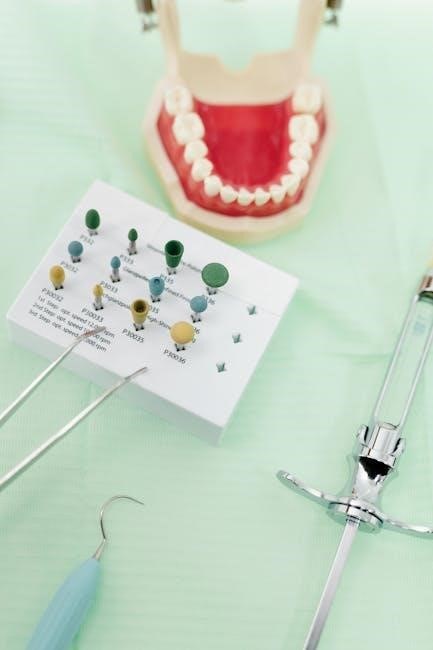Dental Health History Form PDF: An Overview
A Dental Health History Form PDF provides a structured way to collect crucial dental and medical information from patients. This form is essential for dental professionals to understand a patient’s oral health background. It also helps identify potential risks and inform treatment decisions effectively.
What is a Dental Health History Form?
A Dental Health History Form is a comprehensive questionnaire used by dental professionals to gather detailed information about a patient’s past and present oral health. It serves as a foundational document‚ providing insights into various aspects of a patient’s dental experiences‚ habits‚ and overall health conditions that may impact dental treatment.
This form typically includes sections covering personal information‚ medical history‚ dental history‚ medications‚ and allergies. By completing this form‚ patients provide essential data that helps dentists understand their unique needs and potential risks. It’s a crucial tool for ensuring safe and effective dental care.
The information collected allows dentists to identify any underlying conditions‚ such as heart problems or diabetes‚ that may affect treatment decisions. It also helps in detecting potential allergies to medications or materials used in dental procedures. Ultimately‚ the Dental Health History Form is a vital component of patient assessment‚ enabling personalized and informed dental care.
Purpose of the Dental Health History Form
The primary purpose of a Dental Health History Form is to provide dental professionals with a comprehensive overview of a patient’s oral and overall health. This information is crucial for making informed decisions about treatment planning and ensuring patient safety.
By gathering details about a patient’s medical conditions‚ medications‚ allergies‚ and past dental experiences‚ the form helps dentists identify potential risks and contraindications. This allows them to tailor treatment plans to each patient’s specific needs and avoid complications.
The form also serves as a valuable tool for tracking changes in a patient’s health over time. By regularly updating the information‚ dentists can monitor any new conditions or medications that may impact dental care; This proactive approach helps ensure that patients receive the safest and most effective treatment possible.
Ultimately‚ the Dental Health History Form is essential for promoting patient well-being and delivering high-quality dental care.

Key Components of a Dental Health History Form
A Dental Health History Form includes patient information‚ medical and dental history‚ medications‚ and allergies. These components ensure a complete understanding of the patient’s health. This enables dentists to provide safe and effective care.
Patient’s Personal Information
The Patient’s Personal Information section is a fundamental part of a dental health history form. It gathers essential identification details‚ ensuring accurate record-keeping and communication. This section typically includes the patient’s full name‚ date of birth‚ address‚ phone number‚ and email address. Collecting this information establishes a clear patient profile‚ which is crucial for administrative purposes and for contacting the patient regarding appointments or important health updates.
Additionally‚ the form may request emergency contact information‚ including the name and phone number of a close relative or friend. This is vital in case of any unforeseen circumstances during treatment. The inclusion of the patient’s primary care physician’s contact details is also common‚ facilitating communication between healthcare providers for comprehensive care coordination.
Accurate personal information ensures that the dental practice can maintain proper records‚ verify insurance details‚ and communicate effectively with the patient and other relevant healthcare professionals. This detailed information creates a foundation for personalized and safe dental treatment. It also ensures compliance with privacy regulations.
Medical History Section
The Medical History Section of a dental health history form is a critical component. It gathers comprehensive information about the patient’s overall health. This section aims to identify any existing medical conditions‚ past illnesses‚ and ongoing treatments. The information helps dental professionals understand how these factors might influence dental care.
Common questions in this section include inquiries about heart conditions‚ diabetes‚ high blood pressure‚ bleeding disorders‚ and immune system disorders. Patients are asked to disclose any history of surgeries‚ hospitalizations‚ and chronic diseases. Gathering this data allows dentists to assess potential risks and tailor treatment plans accordingly.
Furthermore‚ the medical history section often includes questions about specific conditions. These may affect dental treatment‚ such as pregnancy‚ allergies‚ or the presence of any implants or prosthetics. Detailed medical history provides a holistic view of the patient’s health. This ensures the delivery of safe and effective dental care. It also prevents complications arising from underlying medical issues.
This section also aids in making informed decisions regarding anesthesia and other medications used during dental procedures.
Dental History Section
The Dental History Section focuses specifically on the patient’s past dental experiences and current oral health habits. This section is crucial for understanding the patient’s dental background and identifying potential issues that might affect treatment planning. It covers various aspects of the patient’s dental care history‚ including previous treatments‚ oral hygiene practices‚ and any existing dental problems.
Typical questions in this section ask about previous dental visits‚ including the date of the last visit and the reason for it. Patients are also asked about any past dental treatments such as fillings‚ extractions‚ root canals‚ orthodontic work‚ or gum treatments. Information on oral hygiene habits‚ such as brushing and flossing frequency‚ is also gathered to assess the patient’s commitment to oral health.
Furthermore‚ the dental history section includes questions about specific dental concerns‚ such as tooth sensitivity‚ pain‚ bleeding gums‚ or jaw problems. It also explores any history of dental trauma‚ such as injuries to the teeth or jaw. This section helps dental professionals gain a comprehensive understanding of the patient’s dental background and current oral health status. This allows them to provide personalized and effective dental care.
Medications and Allergies
The Medications and Allergies section is a critical component of the dental health history form. It ensures patient safety by identifying potential interactions or adverse reactions to medications or materials used in dental treatments. This section requires patients to provide a comprehensive list of all medications they are currently taking‚ including prescription drugs‚ over-the-counter medications‚ and herbal supplements. The dosage‚ frequency‚ and purpose of each medication should also be noted.
In addition to medications‚ this section also inquires about any known allergies‚ particularly to drugs‚ latex‚ or dental materials. Patients are asked to specify the allergen and describe the type of reaction they experience. This information allows dental professionals to avoid using products that could trigger an allergic reaction. It also helps them prepare for and manage any potential allergic emergencies that may arise during treatment.
By thoroughly documenting medications and allergies‚ dental professionals can make informed decisions about treatment options and minimize the risk of complications. This section is essential for providing safe and effective dental care tailored to the individual needs of each patient. It is imperative that patients provide accurate and up-to-date information to ensure their well-being during dental procedures.

Importance of a Thorough Dental Health History
A thorough dental health history is paramount for safe and effective dental care. It helps dentists understand a patient’s overall health‚ identify potential risks‚ and tailor treatment plans to individual needs‚ ensuring optimal outcomes and patient safety.
Identifying Potential Risks
A comprehensive dental health history form plays a crucial role in identifying potential risks that could affect dental treatment. By gathering detailed information about a patient’s medical conditions‚ medications‚ allergies‚ and previous dental experiences‚ dentists can proactively anticipate and mitigate potential complications.
For instance‚ patients with certain heart conditions may require premedication with antibiotics before dental procedures to prevent endocarditis. Similarly‚ individuals with bleeding disorders might need special precautions during extractions or surgeries. Awareness of allergies prevents adverse reactions to medications or materials used in the dental office.
Furthermore‚ the dental history can reveal patterns of oral health issues‚ such as recurrent cavities or gum disease‚ which may indicate underlying systemic conditions like diabetes. By identifying these risks early on‚ dentists can modify treatment plans‚ implement preventive measures‚ and collaborate with other healthcare professionals to ensure patient safety and well-being.
A well-documented health history enables the dental team to provide informed and personalized care‚ minimizing the chances of unexpected complications and promoting positive outcomes. The process ensures responsible and safe dental practice.
Informing Treatment Decisions
A dental health history form is pivotal in informing treatment decisions made by dental professionals. The insights gathered from this form provide a holistic view of the patient’s overall health‚ directly impacting the suitability and approach of various dental procedures. A comprehensive understanding of the patient’s medical background‚ including existing conditions‚ medications‚ and allergies‚ ensures treatments are tailored to their specific needs and circumstances.
For instance‚ patients with diabetes may require adjustments to treatment plans due to potential impacts on healing. Similarly‚ certain medications can interact with anesthetics or other drugs used in dental procedures‚ necessitating careful consideration. Allergies to specific materials or medications require the selection of alternative options to prevent adverse reactions.
Furthermore‚ the dental history section offers valuable information about past treatments‚ oral hygiene habits‚ and any recurring dental issues. This knowledge enables dentists to make informed decisions about the most appropriate and effective treatment strategies‚ minimizing risks and maximizing positive outcomes. The information is a bedrock for informed patient care.
By thoroughly reviewing the dental health history form‚ dental professionals can develop personalized treatment plans that prioritize patient safety and long-term oral health.

Accessing and Using Dental Health History Form PDFs
Accessing and using Dental Health History Form PDFs is straightforward. You can easily download templates online. Filling out the form requires accurate and complete information about your medical and dental background for the dentist’s informed treatment planning.
Downloading Templates
Downloading Dental Health History Form templates is a simple process‚ with numerous websites offering free and customizable options. To begin‚ search online for “Dental Health History Form PDF template” to find a variety of sources. Dental association websites and reputable medical form providers are good starting points.
Once you’ve found a suitable source‚ ensure the template is comprehensive and aligns with your specific needs. Look for fields covering personal information‚ medical history‚ dental history‚ medications‚ and allergies. Preview the template to confirm it’s user-friendly and easy to understand.
After selecting a template‚ download the PDF file to your computer or device. Many websites offer direct download links or require you to provide an email address to receive the template. Be cautious of websites that seem suspicious or request excessive personal information.
Always scan the downloaded file with antivirus software to ensure it’s free from malware. Once downloaded‚ you can use the template as is or customize it further using PDF editing software. Remember to store the downloaded template securely and in compliance with privacy regulations.
Filling Out the Form
When filling out a Dental Health History Form‚ accuracy and completeness are paramount. Begin by carefully reading each section and question to ensure you understand what information is being requested. Provide honest and detailed answers to the best of your knowledge. If you are unsure about something‚ don’t hesitate to ask for clarification from the dental staff.
Start with the patient’s personal information‚ including full name‚ date of birth‚ address‚ and contact details. Then‚ move on to the medical history section‚ disclosing any past or present health conditions‚ surgeries‚ and hospitalizations. Be sure to include information about any chronic illnesses‚ such as diabetes‚ heart disease‚ or autoimmune disorders.
In the dental history section‚ provide details about previous dental treatments‚ including fillings‚ extractions‚ and orthodontic work. Indicate if you have experienced any dental problems‚ such as gum disease‚ cavities‚ or tooth sensitivity. List all medications you are currently taking‚ including prescription drugs‚ over-the-counter medications‚ and supplements.
Finally‚ mention any allergies you have‚ particularly to medications‚ latex‚ or dental materials. Double-check all the information you have provided before submitting the form to ensure accuracy and avoid any potential complications during dental treatment;

Maintaining Patient Confidentiality
Maintaining patient confidentiality is a cornerstone of ethical and legal practice in dentistry. Dental health history forms contain sensitive personal and medical information‚ making it crucial to protect patient privacy at all times. All dental staff members must be trained on the importance of confidentiality and adhere to strict protocols for handling patient data.
Dental offices should implement secure systems for storing and accessing patient information. Electronic health records should be password-protected and encrypted to prevent unauthorized access. Physical copies of dental health history forms should be stored in locked cabinets or secure rooms with limited access.
When discussing a patient’s case with other healthcare professionals‚ it is essential to obtain the patient’s consent beforehand. Information should only be shared on a need-to-know basis and in a manner that protects the patient’s identity. Dental staff should avoid discussing patient information in public areas or leaving forms unattended.
Regular audits of data security practices should be conducted to identify and address any vulnerabilities. Patients should be informed about the dental office’s privacy policies and procedures‚ and their rights to access and control their health information. By prioritizing patient confidentiality‚ dental practices can build trust and maintain the integrity of the patient-dentist relationship.

Leave a Reply
You must be logged in to post a comment.